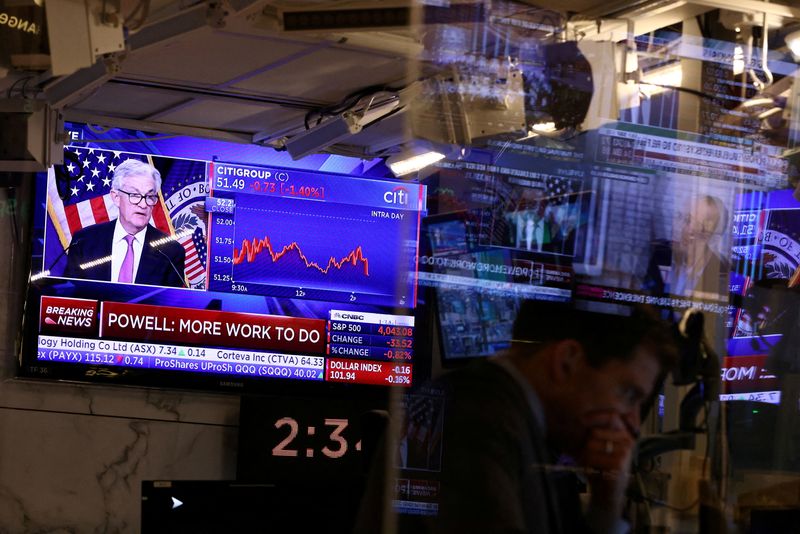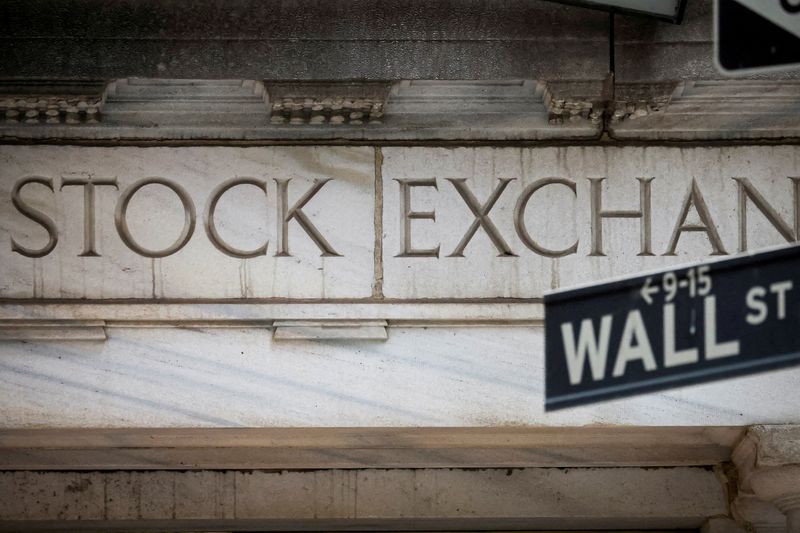By David Randall
NEW YORK (Reuters) -Renewed hawkishness from the Federal Reserve is pushing investors to game out how a regime of “higher for longer” interest rates could weigh on U.S. stocks. Some believe they may be in for a slog.
While stocks have managed to advance during periods when rates were around current levels, some investors are worried a combination of higher bond yields and sticky inflation bodes poorly for equity returns if the Fed follows through on the message of higher and potentially faster rate increases Chairman Jerome Powell delivered this week.
Jonathan Golub, managing director at Credit Suisse, is among those with a bleak outlook for equities. He described an environment in which persistent inflation squeezes companies’ profit margins and investors spurn stocks in favor of Treasuries and other short-term debt, where yields are at their highest levels in nearly two decades for some maturities.
"A six-month (Treasury) yield effectively guaranteed at 5.25% changes the dynamics for investors when the stock market looks shaky," he said. "You would need to get risk-adjusted returns in equities of at least 1 or 2 percentage points more than that, so in that environment stocks are not worth the effort and are dead money.
Golub expects the S&P 500 to end the year near 4,050, about 1.5% above its current level, and offer annual returns in the low single digits through at least 2025 as inflation falls more gradually than many investors expect.
A flat-lining of U.S. equity returns would serve as a harsh turnabout for investors who garnered annual gains of 16% or more in the S&P 500 in four of the six years ending in 2022 as interest rates sank to historic lows in 2020.
Of course, there’s no guarantee such an environment awaits. Investors will be closely watching U.S. employment data on Friday and next week’s consumer price report, which Powell this week said will be key factors in determining whether the central bank will need to go back to the jumbo-sized rate hikes that shook markets last year.
For now, markets are pricing in a nearly 75% chance that the Fed raises rates by 50 basis points at its March 22 meeting, to a range of 5.00 to 5.25%, compared with the 9% chance seen a month ago. Pricing for how high the Fed will ultimately take rates has also shifted, with investors now seeing a 56% chance the central bank brings rates to 5.75% and a 32% chance it takes rates as high as 6%.
Equity valuations, meanwhile, look stretched given the likelihood that rates will remain elevated, dampening future returns, wrote Nicholas Colas, co-founder of DataTrek Research, in a report this week.
"The S&P 500 trades for 17.5x Wall Street analysts’ expected 12-month future earnings, which we continue to believe is simply too high given the uncertainty around rate policy/economic growth," he said. “We therefore remain cautious on US equities.”
At the same time, history suggests that when the yield of the 3-month Treasury bill rises above that of the S&P 500 - as happened early this year for the first time since the dot com bubble - cash typically outperforms equities, analysts at Capital Economics wrote in a note Thursday.
"We suspect Treasuries will also outperform US equities later this year, as the biggest tightening of Fed policy in four decades finally takes a toll on the economy," the firm noted.
Still, stocks have managed to hold onto their year-to-date gains so far even as bond yields have risen, with the S&P 500 up 4% and the Nasdaq Composite up nearly 11%. Some investors believe markets will continue grinding higher.
“You can still make money in stocks, but you need to be in the right segment,” said Nancy Tengler, CEO & CIO of Laffer Tengler Investments, in a recent note. “So cyclicals do well in this particular environment, and that's what we're focused on.”
But Max Wasserman, senior portfolio manager at Miramar Capital, believes the Fed needs to raise rates by another 100 basis points in order to tame inflation - producing an environment that will likely be unfriendly to U.S. stocks.

Wasserman is focusing on dividend-paying stocks and bonds, which he believes offer more attractive short-term returns given that valuations remain stretched. He does not expect the equity market to have a sustained rally until the Fed begins to cut rates in the second half of 2024.
"You no longer have to hold your nose and invest in stocks because there's no other alternative," he said.
